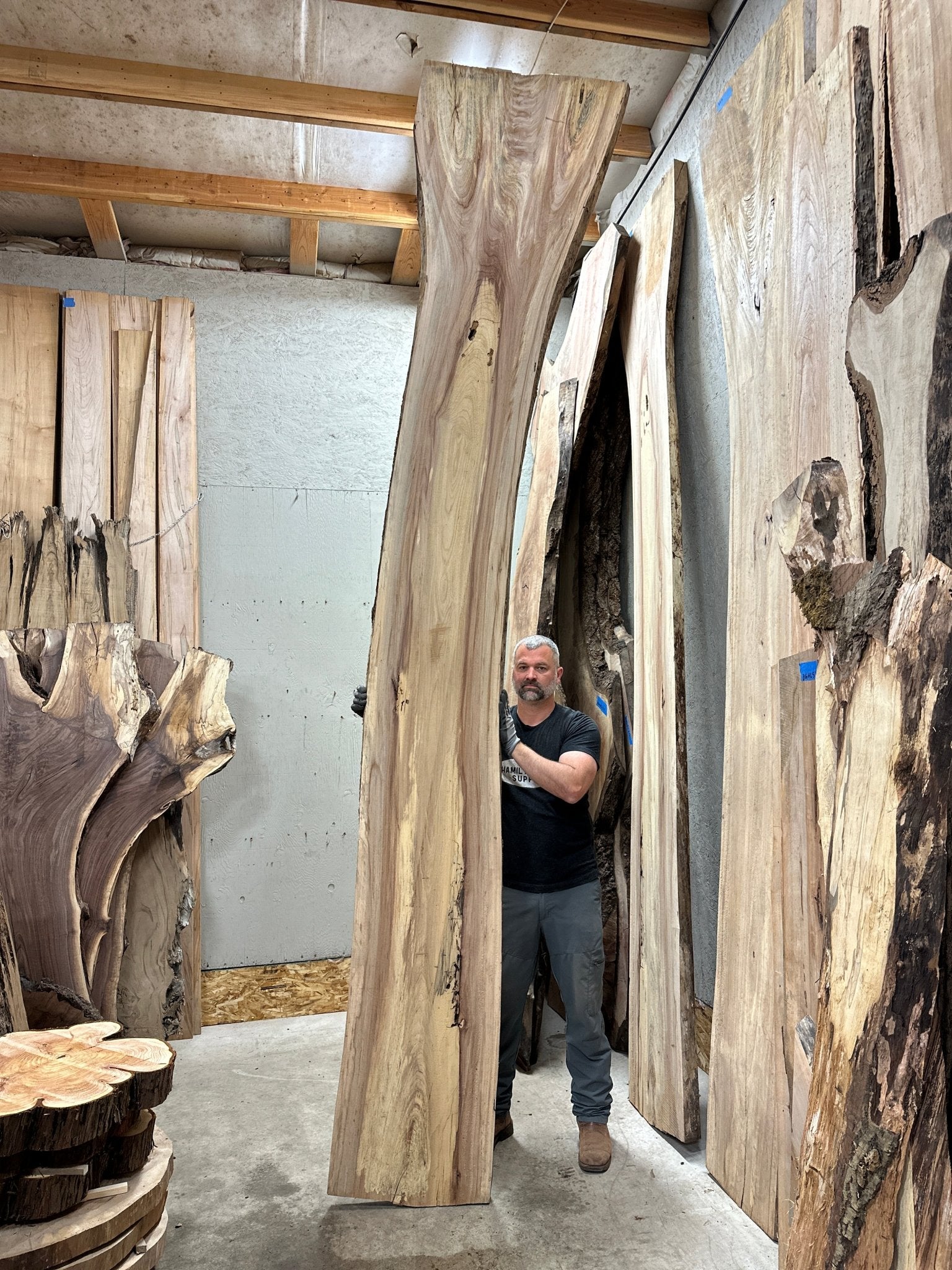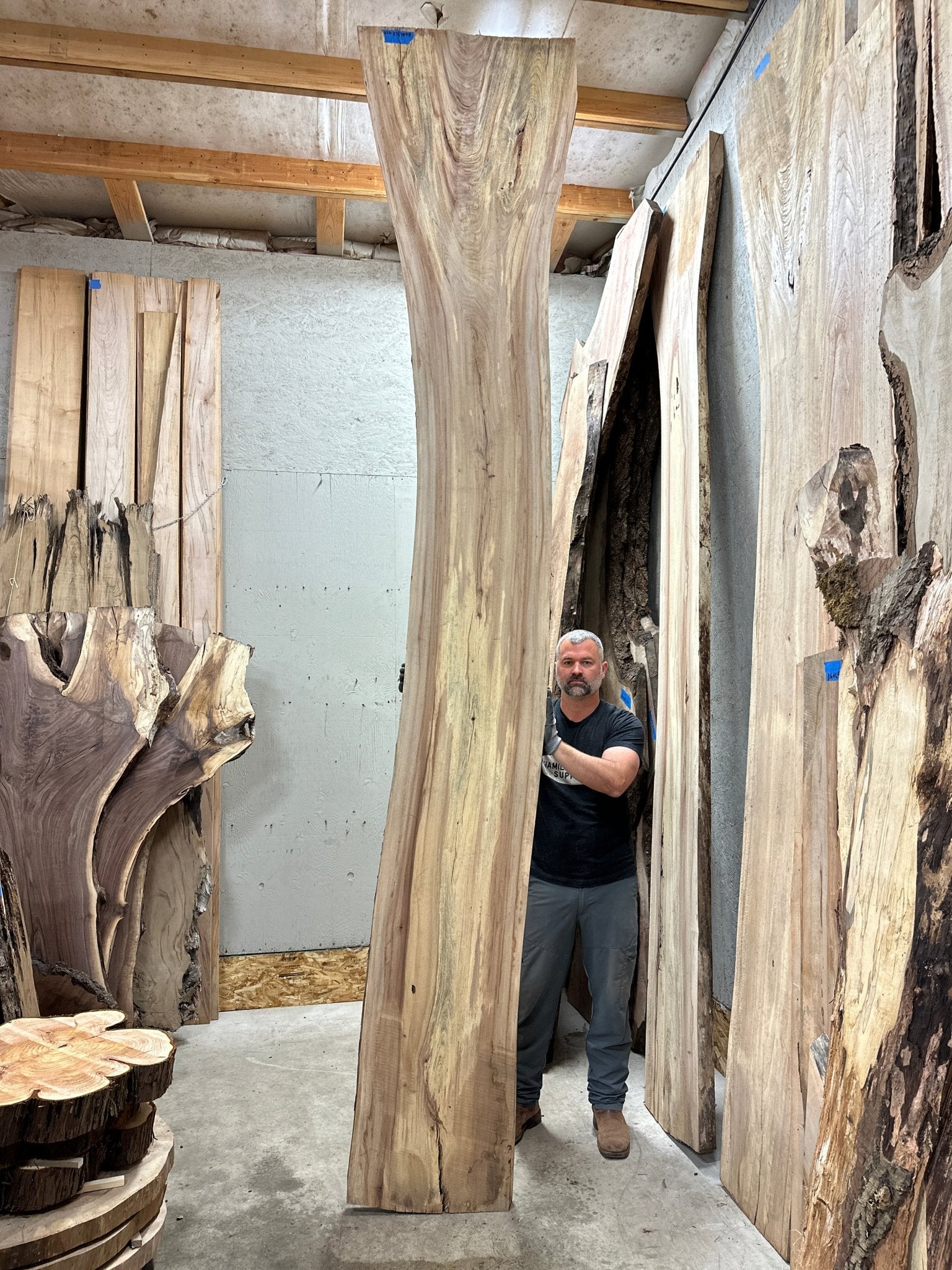LiveEdge Cedar Elm
Couldn't load pickup availability
Species: Cedar Elm
SKU: BGHLSCE429
Length: 149"
Width (Bottom): 29.5"
Width (Middle): 18.25"
Width (Top): 19"
Thickness: 2.375"
Board Foot: 54.68 BDFT
Weight Estimate: 228 Pounds
Origin: Battleground, Washington
Shipping Information:
-Slab Ships From: Battle Ground, Washington
-All slabs are subject to freighted shipping. Once purchased, we will contact you via email or phone to coordinate and secure the best negotiated shipping rate for your location. Shipping costs are based on your zip code, residential/commercial address classification, and whether a liftgate/forklift is required.
If you can't find a slab that perfectly fits your needs among our listed options, feel free to reach out to us directly. We can check our inventory for additional slabs that may suit your preferences.
Contact Information:
-Email: info@hamiltonleesupply.com
-Phone: 360.601.8388
Transform your vision into reality with our remarkable Live Edge slabs. Embrace the artistry of nature in your next woodworking project and create a unique masterpiece for your home.
Crafted with precision and attention to detail, this kiln-dried slab is project-ready, ensuring minimal wood movement and cracking. Our state-of-the-art iDry vacuum kiln removes moisture, guaranteeing its suitability for your project right away.
Please note that as each tree is unique, no two slabs are alike. This individuality guarantees that your furniture piece, whether it's a table, shelf, or any other creation, will be truly one-of-a-kind.
At Hamilton Lee Supply, we are committed to preserving and reusing stunning wood materials. Our focus on sustainability means that every slab tells a story and contributes to a greener future.
Common Names: Cedar Elm
Scientific Name: Ulmus crassifolia
Distribution: Native to southcentral North America
Tree Size: Typically grows to heights of 65100 feet (2030 meters) with trunk diameters of 35 feet (11.5 meters)
Average Dried Weight: Approximately 41 pounds per cubic foot (655 kilograms per cubic meter)
Specific Gravity (Basic, 12% Moisture Content): Ranges from .54 to .66
Janka Hardness: Approximately 1,320 pounds of force (5,870 Newtons)
Modulus of Rupture: Estimated at 13,500 pounds per square inch (93.1 MPa)
Elastic Modulus: Approximately 1,480,000 pounds per square inch (10.21 GPa)
Crushing Strength: Estimated at 6,020 pounds per square inch (41.5 MPa)
Shrinkage: Radial: 4.7%, Tangential: 10.2%, Volumetric: 15.4%, T/R Ratio: 2.2
Color/Appearance: Heartwood is light to medium reddish brown, with welldefined paler sapwood.
Grain/Texture: Grain is interlocked, making it highly resistant to splitting, with a somewhat coarse, uneven texture.
Rot Resistance: Rated as nondurable, and susceptible to insect attack. Living trees are vulnerable to Dutch elm disease.
Workability: Challenging to work due to interlocked grain, especially on quartersawn surfaces. Planing can lead to tearout and fuzzy surfaces. Poor dimensional stability. Glues, stains, and finishes well. Responds well to steam bending and holds nails and screws effectively.
Odor: Elm typically has a strong, unpleasant smell when green but has minimal odor once dried.
Allergies/Toxicity: Although severe reactions are rare, Elm in the Ulmus genus has been reported as a sensitizer, with common reactions including eye and skin irritation. Refer to Wood Allergies and Toxicity and Wood Dust Safety articles for more information.
Pricing/Availability: Generally moderately priced, but availability from mature trees has significantly declined due to Dutch elm disease.
Sustainability: This wood species is not listed in the CITES Appendices or on the IUCN Red List of Threatened Species.
Common Uses: Cedar Elm is used in applications such as boxes, baskets, furniture, hockey sticks, veneer, wood pulp, and papermaking.
Comments: Dutch elm disease, a fungal disease transmitted by elm bark beetles, has had a devastating impact on Elm trees worldwide, greatly reducing their populations.








